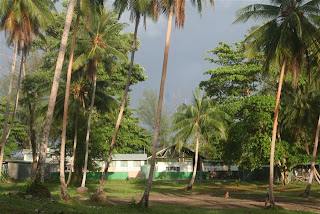
Caption: Pioneer degree graduates Liu Robinson, Christopher Binabat, Jane Wungen, Priscilla Warambin and Joseph Kendou after their graduation last Friday
Five young people, including two females, have made history by becoming the first-ever to graduate with bachelor’s degrees in fisheries and marine resources from PNG University of Natural Resources & Environment (UNRE), formerly University of Vudal.
The university’s fisheries and marine resources (FMR) programme came of age at the National Fisheries College in Kavieng last Friday when UNRE Chancellor Sir Rabbie Namaliu conferred bachelor’s degrees on five fisheries and marine resources pioneer graduates: Christopher Binabat, Joseph Kendou, Robinson Liu, Priscilla Warambin and Jane Wungen.
The graduation marks a new era in the higher education sector of Papua New Guinea as it reintroduces into the workforce, fisheries and marine resources graduates.
The country’s last strictly-fisheries degree graduates graduated in 1983 from the University of Technology in Lae.
The programme then became a part of the University of PNG’s marine biology curriculum; hence, last Friday’s graduation marks a milestone achievement for higher education and paves the way forward for the fisheries industry, both in PNG and the South Pacific.
National Fisheries Authority (NFA), PNG UNRE, German Technical Cooperation (GTZ), University of Bremen’s Centre for Marine Tropical Ecology (ZMT) and the Office of Higher Education (OHE), all contributed in their various capacities towards the successful establishment and administering of the academic course.
Guests at last Friday’s graduation in Kavieng included New Ireland Governor Sir Julius Chan, NFA managing director Sylvester Pokajam, Sir Rabbie and UNRE Vice Chancellor Prof Philip Siaguru.
Ms Wungen, on behalf of the graduands, gave a vote-of-thanks to all who had contributed towards the programme.
“You have done a tremendous job to bring this programme into existence, that will help the country and the citizens of this nation,” she said.
“With the knowledge that was gained in this programme, the students graduating with degrees in fisheries and marine resources now have the ability to assist the government and NGOs to manage marine resources that are becoming scare in many parts of our country, and bring back benefits to our local communities.”
Sir Rabbie said the graduation augered well for the future.
“I believe it is a very good sign for things to come, because we all want to see UNRE become the premier institution of higher learning again in the Pacific Region in the fields of agriculture, fisheries and livestock among other things, just as its distinguished precursor, Vudal Agricultural College, was able to offer in its heyday,” he said.
“Fisheries and marine resources are a vital source of food and vital source of income for our peoples and countries within our region.
“Recently, our government announced a 2050 vision plan for development for PNG in the next 40 years, in which human capital development is one of the main features.
“The government also announced a new marine park in the Madang province where our fisheries and marine resources can be commercially harvested and processed on a sustainable basis to meet the domestic as well as international demand for food and other products.
“Both undertakings will stimulate a growing demand for technical and professional skills and training for which UNRE, in conjunction with the Kavieng Fisheries College, can play a pivotal role in producing graduates.”
Sir Rabbie said several years ago, there were critics and skeptics who questioned the viability and wisdom of introducing the diploma and degree programme in fisheries.
“I am pleased that today’s ceremony, after last year’s ceremony for our first diploma graduates, will put these concerns firmly to rest,” he said,
“I wish to thank PNG UNRE and its staff through the Vice Chancellor, together with the National Fisheries Authority through the Managing Director and GTZ for their foresight and for their efforts in putting this course together.”
Prof Siaguru said at a time when sweeping and significant changes were occurring in the South Pacific, the fisheries and marine resources programme would be a blessing for many people, not only in this country but throughout the Pacific, with the university increasing its intake of international students.
“Today, we have witnessed the beginning of a new dawn for fisheries and marine resources sector in Papua New Guinea,” he said,
“For the first time, after more then 20 years, five students have finally made it through to register themselves as the pioneers of the fisheries and marines resources degree programme.
“This profession has truly come of age.”
Also graduating on the day were 16 students who were awarded diplomas in fisheries and marine resources by Sir Rabbie.
They are the second batch of diplomats under the programme, the first group of seven students graduating in the inaugural fisheries and marine resources graduation ceremony last year.














































